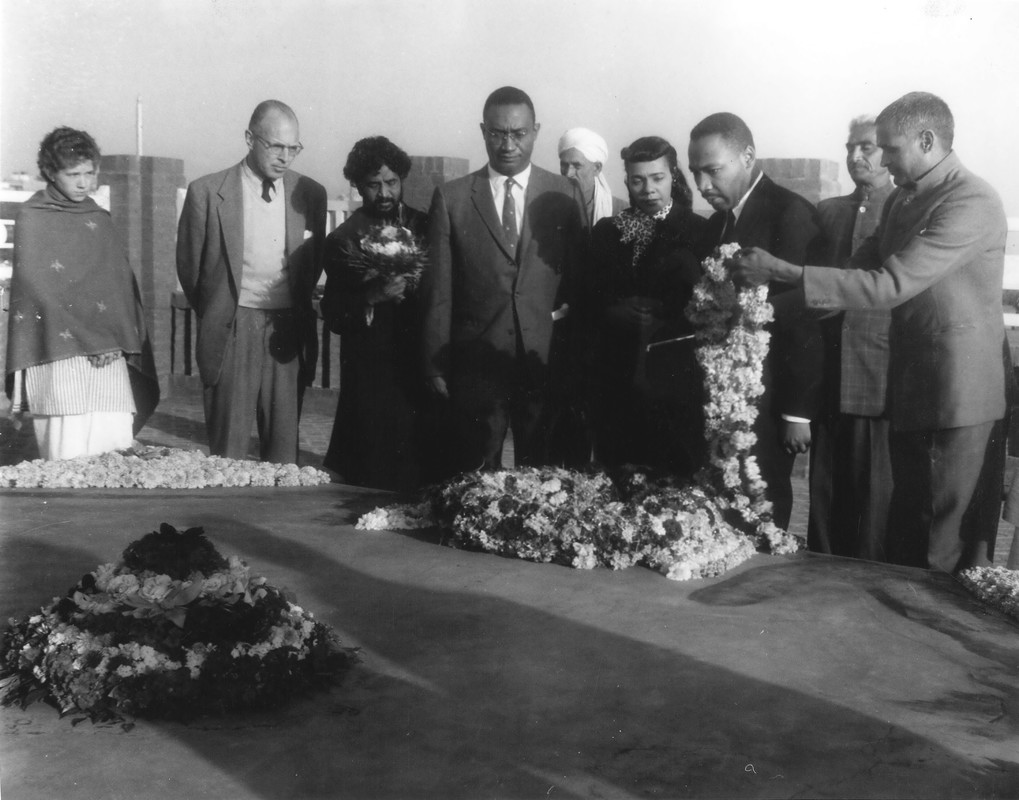
Jim Bristol (second from left) accompanying the Rev. Dr. Martin Luther King Jr. and Coretta Scott King on their AFSC-sponsored trip to India.
This column was originally published in In Depth NH.
One of the great privileges of my career with the American Friends Service Committee was spending a few days with Jim Bristol, when he came to New Hampshire in 1991 to speak about the Rev. Dr. Martin Luther King, Jr. As AFSC’s representative in India, Jim and his wife Dorothy Bristol had hosted Dr. King and his wife, Coretta Scott King, when they visited the Indian subcontinent in 1959 to learn about the Gandhian movement.
Bristol, who was 79 years old, had a serious heart condition that would claim his life a year and a half later. He walked slowly and occasionally popped nitroglycerin tablets, but his mind and memory were sharp. We were on the road to a speaking engagement at Keene State College when news broke that the United States had begun bombing Iraq in what would be our first Persian Gulf war.
Bristol’s trip to New Hampshire, part of an effort to build support for a state holiday named for Dr. King, brought him to events in Bethlehem, Littleton, Rochester, Concord, Lancaster, Groveton, Weare, and Goffstown, in addition to Keene. Speaking to students in Keene, he dropped plans to talk about King’s trip to India and instead led a reflection on pacifist obligations in a time of war.
Bristol had long and deep experience to draw upon. As a Lutheran pastor, he had organized sit-ins to protest racial segregation in the 1930s. When World War II began, he refused a ministerial exemption and spent 19 months in prison instead of violating his pacifist beliefs. Later he worked alongside liberation movements in southern Africa and supported draft resisters and conscientious objectors during the U.S. war in Vietnam. He was still serving on the board of the Central Committee for Conscientious Objectors at the time of his New Hampshire visit.
In time of war, those who are committed to peace have three responsibilities, he said. First, organize to end the war as soon as possible. Second, provide humanitarian assistance to those who need it. Third, and most important, prepare to support reconciliation when the fighting ceases. Speaking to a Keene Sentinel reporter the following day, he said, “It seems that somebody or some people has to break that circle of violence.”
Jim Bristol’s wisdom came back to me when I read a November 16 NY Times article about a new generation of Palestinian and Israeli peacemakers “who want to be part of the dialogue about the ‘day after,’ when the guns go silent, and Israelis and Palestinians are forced to grapple again with how to live with each other.”
Dr. King thought, too, about pathways to peace, which he understood to be “the presence of justice,” not just the absence of violence. In his Nobel Prize lecture delivered in 1964, Dr. King said, “I am not unmindful of the fact that violence often brings about momentary results. Nations have frequently won their independence in battle. But in spite of temporary victories, violence never brings permanent peace. It solves no social problem: it merely creates new and more complicated ones.” This is the dynamic we see playing out in real time in Palestine and Israel.
According to the Times, the young Palestinian and Israeli peacemakers “acknowledge the hurdles to rearranging a diplomatic puzzle that has bedeviled world leaders and their envoys for decades. Even talking about peace at a time of scorched-earth war, they say, can seem fanciful.”
But however fanciful, it is no more naïve than the notion that liberation and security can be achieved by hostage taking, attacks on civilians, and systematic denial of access to food, water, and health care.
“Violence is impractical,” King said in his Nobel lecture, “because it is a descending spiral ending in destruction for all. It is immoral because it seeks to humiliate the opponent rather than win his understanding: it seeks to annihilate rather than convert. Violence is immoral because it thrives on hatred rather than love. It destroys community and makes brotherhood impossible. It leaves society in monologue rather than dialogue. Violence ends up defeating itself. It creates bitterness in the survivors and brutality in the destroyers.”
He also said, “Darkness cannot drive out darkness, only light can do that.”
Today the NY Times published another article about two Israeli citizens, a young Palestinian woman and a Jewish man, touring the United States to talk about how two peoples can share the same land. It’s a steep uphill mission, but let’s cheer for the light. Somebody has to break the cycle of violence.
Disclaimer: The opinions expressed here belong to Arnie Alpert, not to InDepthNH.org.